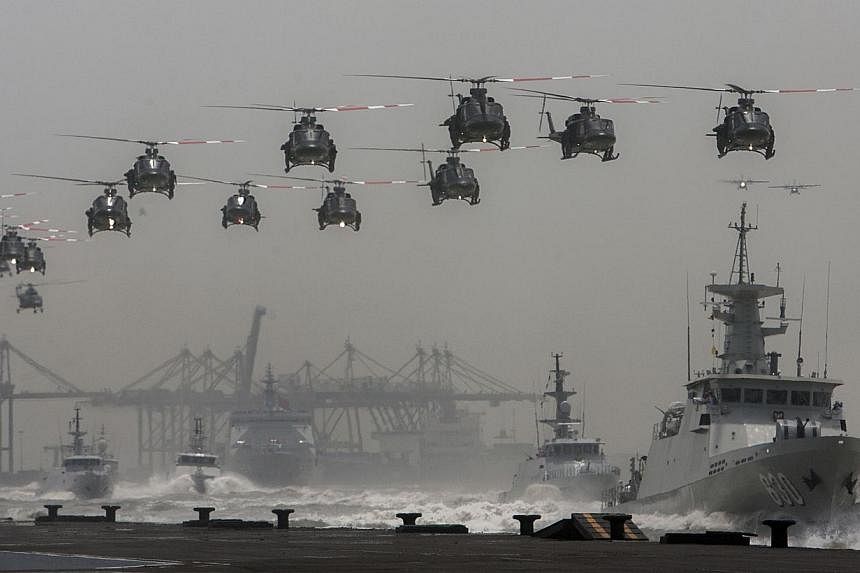The new Indonesian administration of President Joko Widodo will face a number of challenges as a result of the promises of reform made during his presidential campaign in July. Among other things, the Joko Widodo-Jusuf Kalla team promised an impressive and ambitious maritime policy to safeguard Indonesia's economy and defence.
That maritime concerns took centre stage is understandable, as millions of Indonesians still move across the vast archipelago by boats and ferries.
This means that an improvement to the country's maritime logistical capabilities would be hugely important in connecting production and population centres across the nation.
This comes at a time when Indonesia's internal ferry system is still slowly developing, and ferry accidents - particularly during peak periods such as national or religious holidays - are a continuing hazard.
The Joko-Kalla team has also promised a major upgrade of the Indonesian navy and the modernisation of its naval and maritime police capabilities.
The new administration has committed itself to a shallow "green water" fleet that will secure the internal sea lanes and coastal areas of Indonesia by 2024, a move that is intended to address the problems of smuggling (including human trafficking, illegal immigration and refugees) as well as piracy across the archipelago.
On the macro level, these moves have been greeted positively by Indonesia's neighbours: Securing the internal sea lanes of Indonesia will do much in the global effort against piracy and smuggling, and will pay dividends to other international actors who see a more secure South-east Asia as a boon to international trade.
Domestically, the promise to overcome logistical hurdles has also been welcomed by the Indonesian business community that has been fed up with local cartels. These cartels control domestic logistical networks which, in turn, have added to costs and prices of basic necessities like gas, oil, rice and sugar in the outer islands.
But on the ground level, the need for a coherent and effective maritime policy also serves a domestic political need, particularly for communities in Indonesia whose political economy is tied to the sea, such as the Bajao Laut people who live along the Timoro Straits off the south-eastern peninsula of Sulawesi. A community of seafarers, their nomadic ways have been recorded since the 16th century when the first Europeans arrived in South-east Asia.
The "world" of the Bajao Laut is one that is sea-based rather than land-based. The Bajao are found across Sulawesi but also further along the coast of Kalimantan, Sabah (East Malaysia) and southern Philippines, making them a community that transcends political borders.
Up to the 1980s, many of the Bajao still did not possess passports or identity cards that would identify them as Indonesian citizens. Many of them lived on boats out at sea and their life rituals were tied to the sea, as was their income.
Today, most of them are settled in floating villages and their economic activity focuses on fishing and the harvesting of sea cucumber - a delicacy much sought after in Hong Kong and China.
However, their methods of fishing remain rudimentary, and most of them do not possess large fishing boats. Today, Bajao fishermen are facing pressure from other fishing communities, including foreign fishing vessels, that have been encroaching on their waters.
Addressing the needs of communities such as the Bajao Laut will be one of the priorities of the new government of Indonesia: The Joko administration has committed itself to a new maritime policy and the promise of a Maritime Ministry, in keeping with his vision of Indonesia as a maritime country where almost two-thirds of its territory happen to be maritime.
The Bajao Laut are a sizeable community, one among many across Indonesia.
With the slow process of settlement, they are now accounted for, registered and have also become voters. Bajao community activism is on the rise, with the younger generation making demands upon both the Sulawesi provincial government and the central government to recognise their culture, language, and address issues related to their political economy: The main concern being their lack of supportive infrastructure and their inability to compete with non-Bajao fishing vessels that may encroach on their waters, robbing them of their livelihood.
Groups like "Bajao Bangkit" (Bajaos Arise) have started to call for better security, better education and better protection of their fishing waters, and in time such groups have also learnt the art of political lobbying.
The challenges that lie ahead for the Joko-Kalla administration are therefore numerous and complex, but they also have to do with the need to create a government system that takes into account not only economic and security needs but also communal demands from Indonesia's complex multi-ethnic society.
With democratisation and increased political education, the new government now realises that no community is too small or isolated to be neglected.
Farish A. Noor is an associate professor at the S. Rajaratnam School of International Studies (RSIS), Nanyang Technological University.
S.E.A. View is a weekly column on South-east Asian affairs.

